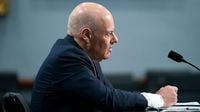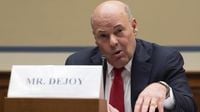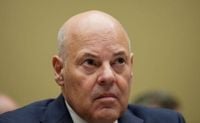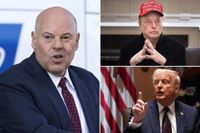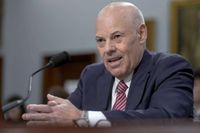Louis DeJoy has resigned from his role as Postmaster General of the U.S. Postal Service (USPS), effective March 24, 2025, after a five-year tenure marked by significant overhaul efforts amid political and operational challenges. His departure was unexpected, as he had previously indicated a desire to remain in the role a bit longer, particularly as he navigated the agency's transition to a new leader. Douglas Tulino, the Deputy Postmaster General, will assume leadership until a permanent successor is appointed by the Postal Service Board of Governors.
DeJoy, who took over the USPS during the uncertain times of the COVID-19 pandemic, announced in February that it was time for the governing board to start identifying a successor, but provided no hints that an abrupt resignation was imminent. His resignation occurs amidst mounting pressure from the Trump administration. President Donald Trump has previously suggested possibilities of privatizing the Postal Service or merging it into the Commerce Department, framing it as financially burdensome for the government.
In a statement, DeJoy expressed that while the USPS had seen substantial changes aimed at financial stability, much work remained to be done. While our management team and the men and women of the Postal Service have established the path toward financial sustainability and high operating performance – and we have instituted enormous beneficial change to what had been an adrift and moribund organization – much work remains that is necessary to sustain our positive trajectory. DeJoy's methods over the years included cutting staff, renegotiating contracts, and implementing modernizing reforms.
His departure comes shortly after he engaged with Elon Musk's Department of Government Efficiency (DOGE), seeking their assistance with cost-cutting measures and operational efficiency improvements. DeJoy struck a deal with DOGE earlier in March that enabled the team to review potential enhancements for the USPS, which had been struggling financially for over a decade. With an extensive restructuring plan, he cut projected long-term losses for the USPS from $160 billion to $80 billion.
Despite initial isolation from the legislative teams and a tumultuous working relationship with DOGE, DeJoy maintained that his management decisions aligned with proposed improvements from DOGE. DeJoy's tenure included a firm position on the independent role and needs of the Postal Service despite both Republican and Democratic criticisms.
Amber McReynolds, chairwoman of the USPS Board of Governors, remarked on DeJoy's service, saying, He has fought hard for the women and men of the Postal Service and to ensure that the American people have reliable and affordable service for years to come. Voices such as Paul Steidler, a senior fellow at the Lexington Institute, also weighed in, commending DeJoy's efforts despite mixed outcomes, stating that he courageously and tenaciously worked for five years to try and fix the U.S. Postal Service.
The Anglo-American tradition shows DeJoy's actions and decisions during his time as Postmaster General were laden with historical precedence, representing attempts at reform that intertwine politics and operations significantly. Challenges during his tenure significantly included fiscal management and service standards, both vital to maintaining agency credibility and public trust.
In 2024, the USPS reported a net profit of $144 million for the first time in years, a noteworthy achievement amid a chronic pattern of losses that had plagued the agency. However, critics like Kevin Yoder, former executive director of the advocacy group Keep US Posted, voiced concerns about the legacy DeJoy leaves behind, recently stating, While we're glad to see DeJoy go, the fear is that his mismanagement will continue casting a destructive shadow.
Still, supporters of DeJoy argue that change and reforms were necessary to navigate the complexities of the USPS's operations and the contemporary environments they operate in. DeJoy's legacy is now left to the evaluation of history as he steps down at a time of anticipated restructuring within the agency.
While the USPS has been under scrutiny for mismanagement and efficiency concerns, the transition to new leadership now rests with Tulino, who has previously supported DeJoy's initiatives. The board has initiated the search for DeJoy's permanent successor, and stakeholders are set to assess what direction the agency will pursue post-DeJoy's reset of operations.
Louis DeJoy’s five-year tenure, marked by significant challenges and transformative efforts, now enters history as it closes the chapter on an era that navigated a pandemic and intense political scrutiny while attempting to restructure an iconic American institution.
